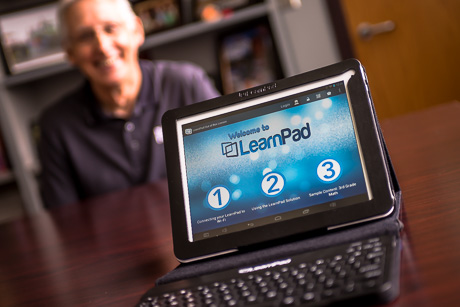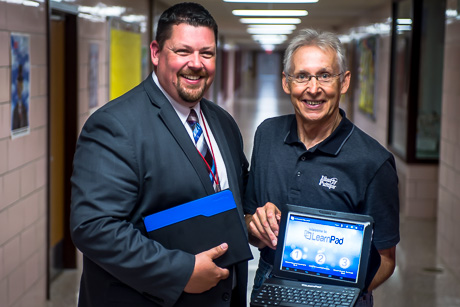
There's a selfish reason Charle Cook got behind the idea of his company donating money to help the Byron-Bergen School District buy 1,100 tablet computers for all of the district's children: He wants potential future employees to have the technical skills to work for the Liberty Pumps of tomorrow.
But the donation is also a good deed that will benefit his and his son's alma mater and perhaps encourage other rural companies to be as generous with their local school districts.
"We felt it's important as kids progress through school that they become knowledgable and comfortable with technology," said Charlie Cook, CEO of Liberty. "It's going to be part of their future employment. To have that as a kind of leg up to students who might not have access is an advantage.
"Somewhat from a selfish standpoint," he added, "we're going to need a certain segment of those graduates, and we're interested in keeping as many kids as we can in the community."
Superintendent Casey Kosiorek said the gift was timely. The district had recently cut a staff position from its library and New York's formula for aid to district continues to disportionately favor affluent suburban districts over rural districts.
"This allows us to do something that most of the school districts in the more affluent areas of the state are able to do," Kosiorek said. "We're very thankful for that."
That was part of what motivated Liberty to seek out a way to assist the district, said Jeff Cook, who initiated the talks with the district that led to the donation.
"The reason Liberty Pumps thought the Learn Pads were a good idea was that we hear a lot about how wealthier, suburban districts seem to have advantages over poorer, more rural districts in terms of course offerings and opportunities for their students," Jeff Cook said. "We were looking for a way to help give our students an edge while minimizing the overhead burden of the district and therefore the taxpayer."
Charlie Cook didn't want to reveal the total monetary amount of the donation, but it's roughly 30 percent of the cost of the 1,100 tablets, which cost a few hundred dollars each. That donation made Byron-Bergen eligible for a technology grant from the state education department that covered the remaining 70 percent of the cost.
There will be no new local spending as a result of the program.
The tablets are known as LearnPads. They are Droid-based tablets with modifications to suit the needs of an educational institution.
First, there are limits on how students can use them. There's access to YouTube, for example, but they can only watch teacher-approved videos. They can only visit approved Web pages. They can only download and install teacher-approved apps.
Teachers control the entire LearnPad environment according to the education needs of the class.
From a desktop computer program, teachers can customize how the LearnPads can be used, develop each day's lesson plan, then provide a QR code that can be posted to a wall. As students enter the class that day or that hour, the student scans the QR code to receive the lesson plan. As class progresses, teachers can monitor student activity to ensure they're staying on task.
However, Kosiorek stressed, LearnPads don't replace lectures and class discussions.
"This is a great tool for students and for teachers, but it doesn't replace quality education," Kosiorek said. "It's a tool, it's a supplement, an addition to a teacher's toolbox."
There are educational books available on the LearnPad and Kosiorek said the district hopes to someday replace all of its text books with tablets. That would save the district money as well as end the days of one-ton backpacks and multiple trips to lockers for students.
And yes, there are games available to students. Math games and vocabulary games, for example.
"Many students have access to video games and those games are very engaging," Kosiorek said. "There are goals that are set and you work toward those goals, so whatever we can do to provide relevance and engagement for students (we will do)."
Every student, starting this week, gets a LearnPad, from kindergarten through 12th grade. The younger students don't get a keyboard and will just use the touch screen, but starting in about third grade, keyboards will be introduced.
At younger grades, the LearnPads stay in school -- at least until the summer, when they can go with the summer reading program already installed -- while older children can bring the LearnPads home for homework once permissions slips and guideline acknowledgments are signed.
"We're very excited to be doing it," Charlie Cook said. "I've got four grandkids in the system right now and when I come to an event, which I do as often as I can, it's amazing to me to watch these kids work with the technology, even what they have currently. I think even in preschool years, they were up operating the touch screen, so this is a natural progression for them."
Jeff Cook said he hopes other business owners will look at this initiative and contact their own school administrators and ask "How can we help?".
Education, after all, is everybody's business.
"My hope is that what Liberty Pumps is doing will gain traction in the business community and others will join in on supporting our schools," Jeff Cook said. "If you are a business that is passionate about something you would be willing to help fund or support, I would suggest talking to the school administration about your idea and see if it is feasible.
"In the case of Byron-Bergen, they did all the leg work and presented us with their vision based on our ideas. This could be anything from supporting sport programs and class offerings, to equipment for the district. Anything that could enhance a student's learning opportunity."

Photo: Casey Kosiorek, left, and Charlie Cook.
